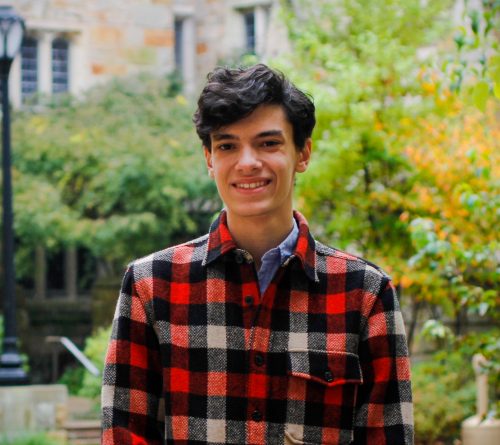Growing up five blocks away from the Museum of Natural History in New York, current senior Alexander Epstein (SY ’18) was constantly roaming around its exhibitions from a young age. As a child, he never stopped absorbing new information. Many of the museum’s teachings surprised him, jump-starting his interest in science; in particular, he was fascinated with the Vertebrae Evolution Hall at the museum. “It can prompt you to rethink your entire view of life,” Epstein said. For example, he discovered there that fish are not a valid evolutionary group: salmon are more closely related to humans than to sharks, so there can’t be an evolutionary group that includes salmon and sharks, but not humans. “As a kid, this made me rethink a lot of how I felt about the world. It got me into science again and again,” Epstein said.
During high school, Epstein developed interests in other subjects as well; he especially enjoyed his history and English classes. He was on the robotics team and helped build a 120-pound metal robot to compete in various events. At Yale, Epstein chose to hone in on his passions by double-majoring in Chemistry and Molecular, Cellular, and Developmental Biology (MCDB). He feels that Yale is a great place to study science because it cultivates a nurturing environment, especially in the upper-level courses. Aside from schoolwork, Epstein is a Cell Biology peer tutor and was the former Elementary Curriculum Coordinator for the MathCounts Outreach program, which aimed to make math accessible to students in New Haven public schools. Moreover, Epstein is incredibly passionate about his academic interests, having dedicated his past three summers to cell biology research.
Epstein began conducting scientific research in high school, where he worked at a private company near New York City. “In spite of every failure I had—because research is ninety-nine percent failure—I still enjoyed it,” Epstein said. As a result, Epstein was compelled to continue pursuing research at Yale, where he ultimately ended up working in the lab of MCDB Professor Thomas Pollard.
Epstein’s research in Professor Pollard’s lab focuses on the actin filament cytoskeleton, which holds the shape of the cell together. Actin filaments are composed of protein building blocks that assemble together into long rods. Like Lego bricks, they can be assembled into a wide variety of different structures, each of which serves a special function inside the cell. Epstein is currently studying the Arp2/3 complex, a protein-based machine that builds huge branched networks of actin, pushing the front of a cell forward as it moves and helping the cell to take in nutrients through a process called endocytosis. He is exploring how the protein complex is regulated, so that these branched networks are assembled at the right time and in the right place, supporting successful endocytosis.
Deservedly, Epstein has received recognition for his hard work. He was awarded the Beckman Scholarship as a sophomore in recognition of his research background and scientific promise. Each Beckman Scholar is given financial support to continue their research over the course of one academic year and two summers. Epstein was also awarded the Goldwater Scholarship in his junior year, which recognizes his commitment to research and potential for being a future leader in his field. The scholarship is one of the oldest and most prestigious undergraduate awards for students in STEM fields and provides a substantial scholarship.
Despite his numerous accolades, Epstein is most proud of the knowledge that he has attained at Yale. “I went in knowing a little bit of biology and not very much of math and physics—I didn’t know multivariable calculus—and now I’m taking abstract algebra, physical chemistry, and have some understanding of quantum mechanics. What I could do then versus what I can do now… This difference is what I’m most proud of,” Epstein said.
Next year, Epstein plans on finding a fellowship that will enable him to do research. He is interested in studying the structure of protein aggregates, or misfolded proteins clumped together, which contribute to Alzheimer’s Disease. This type of research would involve many techniques that Epstein has never performed before, which he views as a great learning opportunity. Much like the cells that he has studied at Yale, Epstein is always moving forward.

